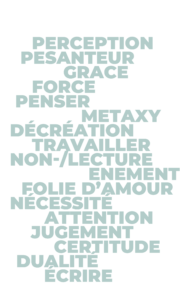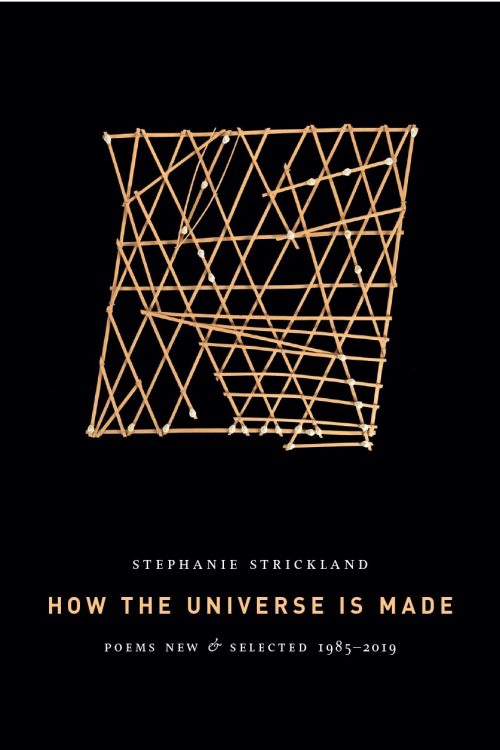
Stephanie
is a poet living in New York City. She has published nine volumes of print poetry and co-authored eleven digital poems. Her files and papers are being collected by the David M. Rubenstein Rare Book And Manuscript Library at Duke University.
Key
In this poem, Stephanie refers to Simone Weil’s notion of “reading,” one of the ways we are physically imbricated in knowing. Stephanie shares Robert Kemp’s wish. Kemp speaks, as Thomas R. Nevin says, “for all Weil enthusiasts in the remark, comme on voudrait la rappeler sur cette terre, pour lui dire qu’on l’aime, et pour lui demander certaines précisions.”
SOUL LEARNS EVERYTHING FROM BODY
The bird forgets,
but the trap does not. Cassandran,
her harsh voice worrying, probing: If any
human being show need of any other, a little
or a lot, why does the latter run away?
I have much experience, on one side or the other.
Everything from the body:
a boy
running down the field can read so well, his hands
are unimpeded, have already caught the pass;
reached out before
he saw. Finally,
not to read at all: hands alone
fly up, whole body shaping the air, weaned, immediate.
The soul learns turning,
inclination,
fatigue:
to be worn down.
The body,
unastonished by reduction; it feels
what can be shown:
that there exist remarkable
leafless trees of blossom,
tiny
back and forth of almond, long, touched, wands of pink
that shudder down their whole length and are blown to the pavement
almost at once—


New contributions:
Rachel Pafe (Berlin): The Miracle of Love Amidst the Crushes of War: Thinking through The Iliad with Susan Taubes and Simone Weil
Rachel Pafe is a writer and researcher interested in modern Jewish thought and critical theories of mourning. She is currently doing a joint PhD at Goethe University of Frankfurt and Université Lille. For more information visit Rachel’s Page. To read the German-version of the article, please click here. In her 1956 dissertation on French philosopher-mystic Simone
Marcus Steinweg (Berlin): “Notizen zu Simone Weil”
Leseschlüssel Die hier gelisteten – teils veröffentlichten, teils unveröffentlichten – Notizen von Marcus Steinweg beziehen sich allesamt auf Simone Weil. Die Liste ist offen und wird schrittweise durch neue Notizen erweitert. RIGORISMUS An Simone Weil besticht ihr Rigorismus und ihre Klarheit. Noch wenn sie sich dem Alltäglichen zuwendet, geht der Vektor ins Nichts. Nie versenkt
Elisabeth Hubmann (Genève): Organ improvisations in response to Simone Weil’s “Les Lutins du feu” (ca. 1921/22)
Il dansait, il dansait toujours, le peuple des âmes candides, des âmes des enfants qui ne sont pas encore nés; attendant leur tour d’être des hommes, les lutins se poursuivaient sur les bûches crépitantes. Simone Weil, Les Lutins du feu, 1921/22. ELISABETH HUBMANN Abstract Elisabeth is an organist, musicologist, and environmentalist active in Genève, Amsterdam
Wolfram Eilenberger (Berlin) und Martina Bengert (denʞkollektiv): Eine Denkerin der radikalen Hoffnung
Overview Am 31. Januar 2021 diskutierten Martina Bengert und Wolfram Eilenberger in dem von Simone Miller moderierten Podcast “Philosophin Simone Weil. Eine Denkerin der radikalen Hoffnung” der Reihe Sein & Streit des Deutschlandfunk Kultur über die Aktualität Weils für unsere heutige Zeit. On the 31 January 2021, Simone Miller welcomed Martina Bengert und Wolfram Eilenberger
Chris Kraus (Los Angeles): Simone Weil. Two Days in February
THE PAPIER collé AS PART OF THE »PAPIER collé SIMONE WEIL« WE INVITED WRITERS AND ARTISTS TO SHARE THEIR IDEAS ON SIMONE WEIL. SOME BITS AND PIECES, SOME MATERIAL, THOUGHTS… TRACES AND LINES THAT REVOLVE AROUND THEIR READING OR RESEARCH. LIKE A SUNDAY STROLL THROUGH AN IMMATERIAL-IMAGINATIVE LIBRARY. LIKE A BORGES READING MACHINE THAT UNENDINGLY
Mark von Schlegell: Simone Azul
THE PAPIER collé AS PART OF THE »PAPIER collé SIMONE WEIL« WE INVITED WRITERS AND ARTISTS TO SHARE THEIR IDEAS ON SIMONE WEIL. SOME BITS AND PIECES, SOME MATERIAL, THOUGHTS… TRACES AND LINES THAT REVOLVE AROUND THEIR READING OR RESEARCH. LIKE A SUNDAY STROLL THROUGH AN IMMATERIAL-IMAGINATIVE LIBRARY. LIKE A BORGES READING MACHINE THAT UNENDINGLY